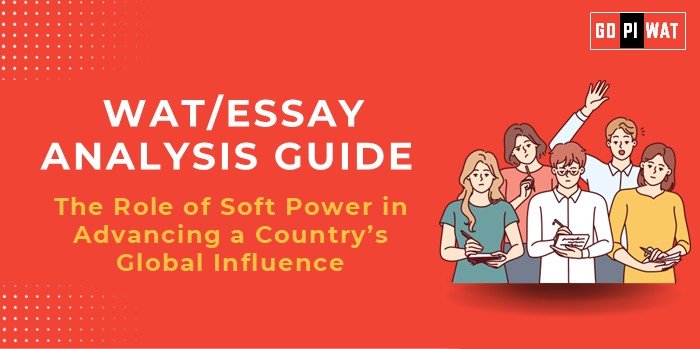📋 Written Ability Test (WAT)/Essay Analysis Guide
📝 Topic: The Role of Soft Power in Advancing a Country’s Global Influence
🌐 Understanding the Topic’s Importance
Soft power directly correlates with a nation’s ability to shape global perceptions, crucial for business and diplomacy. This essay links cultural diplomacy with leadership potential in the international arena.
📚 Effective Planning and Writing
- Time Allocation:
- ⏱️ Planning: 5 minutes
- ✍️ Writing: 20 minutes
- 🔍 Review: 5 minutes
- Introduction Techniques:
- 🌟 Contrast Approach: “While military power intimidates, soft power inspires—a modern strategy for global leadership.”
- 💡 Solution-Based: “In an era of interconnected challenges, soft power provides a path to collaboration and influence.”
📖 Structuring the Essay Body
- Achievements: Highlight cultural and educational exports, using examples like the British Council and Hollywood.
- Challenges: Analyze gaps in inclusivity and trust, referencing skepticism about China’s initiatives.
- Future Outlook: Discuss the role of digital diplomacy and soft power in addressing global challenges.
🎯 Concluding Effectively
- ⚖️ Balanced Perspective: “While soft power enhances global influence, its success depends on authenticity and inclusivity.”
- 🌍 Global Comparison: “As nations adopt soft power strategies, learning from leaders like South Korea and France can enhance effectiveness.”
🔑 Recommendations for Sustainable Progress
- 🌐 Invest in inclusive cultural exchange programs.
- 📱 Leverage digital platforms for broader reach.
- 🛡️ Align soft power initiatives with global ethical standards.
📄 Sample Short Essays
- Balanced Perspective:
“Soft power, rooted in culture and diplomacy, has become indispensable in global relations. Countries like South Korea demonstrate its potential through cultural exports like K-pop. However, without inclusivity and authenticity, soft power risks being perceived as mere propaganda. Balancing these factors is key to sustainable influence.”
- Solution-Oriented:
“Soft power offers a non-coercive path to influence, as seen in India’s yoga diplomacy and China’s Confucius Institutes. To maximize impact, nations must address challenges such as equitable outreach and transparency. Digital platforms can bridge gaps, making soft power a vital tool for the 21st century.”
- Global Comparison:
“While the US leads in soft power through Hollywood and education, South Korea’s Hallyu and India’s yoga diplomacy highlight diverse approaches. Learning from these successes, nations can craft unique strategies to enhance global influence.”


